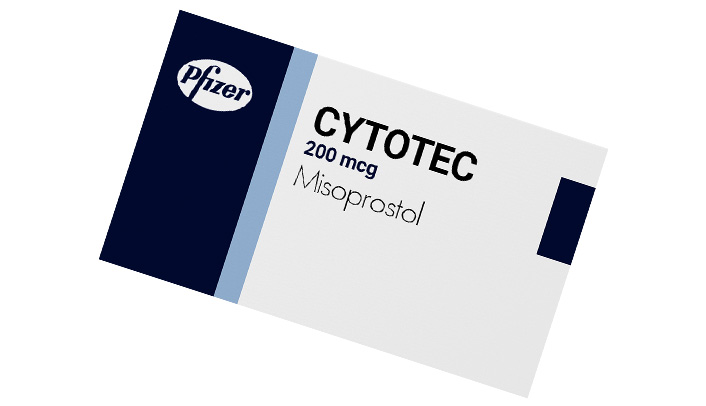Cytotec
Composition / active ingredients
0.2 mg Misoprostol, Hypromellose, Microcrystalline cellulose, Sodium carboxymethyl starch (type A), Hydrogenated castor oil

What is Cytotec and when should it be used?
Various stomach diseases and pains may be due either to excessive gastric acid production, or to the use of anti-inflammatory agents which reduce the defense mechanisms of the stomach mucosa. Misoprostol reduces stomach acid production and reinforces the defense mechanisms of the gastrointestinal mucosa. In this way, damage induced by excessive acidity or analgesics can be reduced. Cytotec can only be used on prescription.
What else needs to be taken into account?
During treatment with Cytotec, refrain from consuming foods and beverages that could harm your stomach. Smoking and alcoholic beverages are also not recommended during treatment.
You should also avoid taking magnesium-based medications to treat gastric acidity.
Medicament does not affect your ability to concentrate or to drive.
When should Cytotec not be used?
Because Misoprostol can cause miscarriage, it is contraindicated if you are of childbearing age and are not using an effective method of contraception (IUD, oral contraceptives).
Similarly, Cytotec should not be administered if you are hypersensitive to misoprostol, other components of the product or prostaglandins.
What precautions should be taken when taking Cytotec?
Use this drug with caution if you have cerebrovascular or cardiac disease, in which hypotension could precipitate severe complications.
Drug has not been tested in patients with impaired liver function.
The development of gastric or duodenal ulcers cannot be totally excluded during Cytotec treatment, even in the absence of symptoms.
Medication has not been tested in children and adolescents under 18 years of age, and should not be given to them.
Please inform your doctor or pharmacist if you:
- you suffer from any other disease,
- you have allergies or
- you are already taking other internal or external medications (even if you are self-medicating!).
Can Cytotec be taken during pregnancy or while breast-feeding?
Medicament is contraindicated both during pregnancy and when breast-feeding.
How do I use Cytotec?
For the treatment of gastric and duodenal ulcers, as well as anti-inflammatory-induced gastric ulcers, the dosage is as follows, provided you must continue your anti-inflammatory treatment:
4 tablets a day, divided into 2 or 4 doses, with meals and before bedtime, for 4 to 8 weeks.
For the prevention of gastric and duodenal ulcers exclusively if you suffer from a severe form of inflammatory rheumatism requiring continuous anti-inflammatory treatment:
2 tablets a day, 1 in the morning and 1 in the evening, with meals.
Do not change the prescribed dosage on your own. Contact your doctor or pharmacist if you feel the drug is too weak or too strong.
What side effects may Cytotec have?
Medicine may cause the following side effects:
Mild to moderate diarrhoea occurs very frequently. This usually disappears after a few days, even when Cytotec treatment is continued.
Stomach ache, nausea, digestive problems, bloating, vomiting, constipation, dizziness and headaches are frequently reported. Occasionally, vaginal bleeding (even after the menopause), intermenstrual bleeding, menstrual pain and disorders, prolonged menstruation and uterine cramps are observed, and rarely, severe diarrhoea with fluid loss. Chills, fever, severe allergic reactions, rash and uterine bleeding also occur.
If this medicine has been administered during pregnancy, it has caused amniotic embolism, abnormal uterine contractions, stillbirths, incomplete abortions, premature deliveries, placental retention, uterine rupture or perforation, and congenital malformations.
If you notice any side effects not listed in this leaflet, please inform your doctor or pharmacist.
What else do we need to watch out for?
Store at room temperature (15-25°C), out of the reach of children.
The medicine must not be used after the date shown on the container after the word “EXP”.
For further information, consult your doctor or pharmacist, who have detailed information for professionals.
What does Cytotec contain?
1 tablet contains 200 µg misoprostol and excipients: methylhydroxypropylcellulose, microcrystalline cellulose, cellulose, sodium starch glycolate and hydrogenated castor oil.
Where do you get Cytotec? What packaging is available on the market?
In pharmacies, on prescription.
Drug is available in packs of 30 and 100 tablets.



